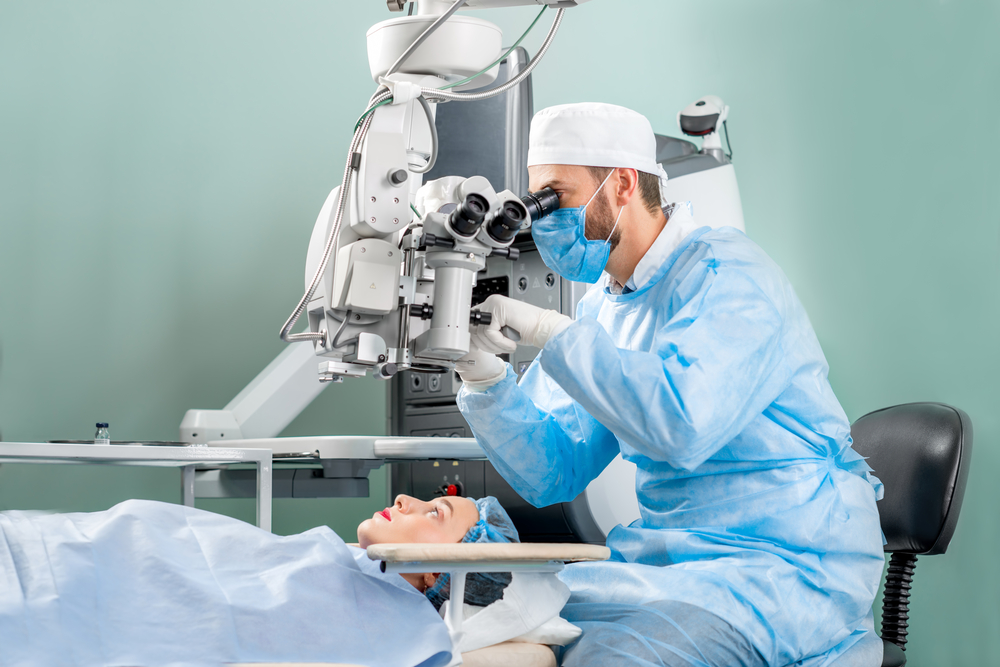
When your vision begins to resemble a foggy window, it's possible that cataracts are the culprit. A cataract is a clouding of the lens in your eye, which is normally clear. This condition can make it seem like you're peering through a misted-up or frosty lens, causing your sight to lose its former clarity and brilliance. Understanding what cataracts are is the first step toward regaining the vivid visuals you once enjoyed.
How Do Cataracts Develop?
The genesis of cataracts can often be attributed to age, but there are other factors at play that can expedite or contribute to their development. The lens inside your eye works much like a camera lens, focusing light onto the retina for clear vision. It also adjusts the eye's focus, letting you see things both up close and far away. The lens is made of water and protein. As you age, some of the protein may clump together and start to cloud a small area of the lens, forming a cataract.
Other contributors to cataract development include genetic disorders that can cause other health problems and increase your risk. Environmental factors, such as prolonged exposure to ultraviolet sunlight, can also enhance the likelihood of cataract formation. Additionally, lifestyle choices like smoking or excessive alcohol consumption can exacerbate the risk. Even certain types of medication, such as corticosteroids, can lead to the early development of this eye condition.
Beyond these factors, health conditions such as diabetes or hypertension can accelerate cataract formation. Injuries to the eye can also result in cataracts, even if the injury occurred many years before the cataract appears. It's essential to understand these causes because they highlight the importance of regular eye examinations and healthy lifestyle choices in the prevention and early detection of cataracts.
Symptoms of Cataracts
Noticing the symptoms of cataracts can be akin to watching the slow progression of a sunrise. Initially, it's a gradual change that might not impede your daily life. However, over time, the symptoms become more pronounced. Initially, you might experience a slight blurring of vision, akin to looking through a cloudy piece of glass. Colors may not appear as bright as they once did. It's as if the world has turned down the saturation knob, making everything look a little less vivid.
As the cataract continues to develop, your night vision might take a hit. You may find it harder to see in low-light conditions, and glare from lights can become a serious issue, particularly when driving at night. Oncoming headlights might cause more glare than before, and halos might appear around lights, making it difficult to navigate the dark.
Another symptom is frequent changes in your glasses or contact lens prescription. It may seem like as soon as you adjust to a new prescription, your vision blurs once again, necessitating yet another change. Double vision in one eye can also be a sign that a cataract is forming. These symptoms collectively signal that it might be time to consult with an eye care professional about the possibility of cataracts and discuss the potential of cataract surgery to restore your vision.
What You Need to Know About Cataract Surgery
Cataract surgery is a procedure that involves the removal of the clouded lens of your eye (the cataract) and, in most cases, replacing it with a clear, artificial lens. This operation is one of the most common and safe procedures performed today, with a high success rate in improving vision. For countless individuals, it has been a gateway to a world of clearer, sharper images.
The technical term for the artificial lens that replaces your clouded lens is an intraocular lens (IOL). This lens becomes a permanent part of your eye and can drastically improve your vision. The procedure is typically done on an outpatient basis and does not require an overnight stay in a hospital or other care facility. Local anesthesia is used to numb the area around your eye, ensuring that you are comfortable and pain-free throughout the surgery.
Consultation with Opticore Optometry Group for Cataract Surgery
When you decide it's time to address the cataracts impairing your vision, scheduling a consultation with our optometrist at Opticore Optometry Group can set you on the path to clearer sight. Our team is dedicated to providing comprehensive care and will evaluate your eyes to determine if you are a suitable candidate for cataract surgery. We'll consider all aspects of your eye health and discuss any concerns or questions you may have about the procedure.
During your consultation, our doctor will conduct a thorough eye examination. This will include tests to assess the shape and health of your eye, as well as measurements to determine the appropriate power for the intraocular lens that will replace your clouded lens. You will be informed about the different types of IOLs available, such as monofocal, multifocal, or accommodating lenses, each designed to meet individual vision correction needs.
At Opticore Optometry Group believe in a personalized approach to eye care. We'll take the time to understand your lifestyle and visual requirements, ensuring that the surgical plan we recommend is tailored to you. Our goal is to help you achieve the best visual outcome and to make your journey from consultation to surgery as smooth and informed as possible. Your vision is our priority, and we strive to provide the highest quality of care every step of the way.
If you're noticing changes in your vision or if you're concerned about cataracts, schedule your consultation with Opticore Optometry Group today. Visit our office in Chino, Redlands, Fontana, or Riverside, California, or call 866-202-2221 to book an appointment today.
Author: Antoinette Vu & Opticore Optometry Group











